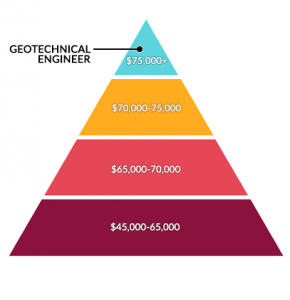9 Easy Facts About Geotheta Explained
9 Easy Facts About Geotheta Explained
Blog Article
More About Geotheta
Table of ContentsGeotheta Things To Know Before You Get ThisGeotheta - An OverviewExamine This Report on GeothetaThe 20-Second Trick For GeothetaWhat Does Geotheta Mean?

They perform website investigations, collect samples, perform research laboratory examinations, and examine data to assess the suitability of the ground for construction projects - Geo Tech Engineering. Based upon their searchings for, geotechnical engineers give recommendations for structure design, slope security, retaining structures, and mitigation of geotechnical hazards. They team up with various other professionals, such as architects, architectural engineers, and building and construction teams, to make sure that geotechnical factors to consider are incorporated right into the total task layout and application
By evaluating the habits and buildings of dirt and rock, they can determine possible geotechnical threats such as landslides, dirt negotiation, or slope instability. Their proficiency helps stop failings or accidents that might endanger lives and building. Right here are some detailed duties and responsibilities of a geotechnical engineer: Website Examination: Geotechnical designers conduct website examinations to collect data on subsurface problems.
They interpret the data to comprehend the buildings and actions of the dirt and rock, including their strength, permeability, compaction attributes, and groundwater conditions. Geotechnical Analysis and Design: Geotechnical designers analyze the information accumulated during site examinations to evaluate the security and suitability of the site for building projects. They perform geotechnical computations and modeling to assess factors such as birthing capability, negotiation, incline stability, lateral planet pressures, and groundwater flow.
The Of Geotheta
Structure Layout: Geotechnical designers play a crucial duty in creating foundations that can safely sustain the designated framework. They examine the dirt problems and load needs to establish the ideal foundation kind, such as superficial foundations (e.g., grounds), deep foundations (e.g (https://medium.com/@ianhammond2191/about)., stacks), or specialized strategies like dirt enhancement. They take into consideration elements such as settlement limits, bearing capacity, and soil-structure communication to create optimum foundation layouts
They examine building plans, monitor website activities, and perform field examinations to confirm that the style referrals are followed. If unexpected geotechnical issues arise, they assess the situation and give suggestions for remediation or adjustments to the layout. Threat Evaluation and Mitigation: Geotechnical designers assess geotechnical threats and threats connected with the task site, such as landslides, liquefaction, or soil disintegration.

Partnership and Communication: Geotechnical engineers function carefully with other professionals included in a job, such as architects, architectural engineers, and building and construction teams. Effective interaction and partnership are necessary to incorporate geotechnical considerations into the total task layout and building and construction procedure. Geotechnical designers offer technical knowledge, solution inquiries, and make sure that geotechnical requirements are fulfilled.
How Geotheta can Save You Time, Stress, and Money.
Here are some sorts of geotechnical engineers: Foundation Engineer: Foundation engineers focus on making and examining structures for frameworks. They examine the dirt conditions, tons needs, and website attributes to figure out one of the most ideal foundation type and layout, such as he said superficial structures, deep structures, or specialized methods like heap foundations.
They evaluate the factors influencing slope stability, such as dirt buildings, groundwater conditions, and slope geometry, and create strategies to avoid incline failures and mitigate threats. Earthquake Designer: Quake designers focus on assessing and designing structures to stand up to seismic pressures. They analyze the seismic risk of a site, evaluate dirt liquefaction possibility, and establish seismic design criteria to make sure the security and durability of frameworks throughout earthquakes.
They perform area screening, accumulate samples, and evaluate the collected data to define the dirt properties, geologic developments, and groundwater conditions at a site. Geotechnical Instrumentation Engineer: Geotechnical instrumentation engineers focus on surveillance and gauging the actions of dirt, rock, and structures. They install and keep instrumentation systems that monitor elements such as soil settlement, groundwater levels, slope movements, and architectural variations to examine performance and offer early cautions of potential issues.
All about Geotheta
They perform tests such as triaxial examinations, loan consolidation tests, direct shear tests, and leaks in the structure tests to gather information for geotechnical analysis and layout. Geosynthetics Engineer: Geosynthetics designers concentrate on the layout and application of geosynthetic products, such as geotextiles, geogrids, and geomembranes. They make use of these products to improve dirt security, strengthen inclines, offer water drainage options, and control erosion.
They often tend to be investigatory people, which implies they're intellectual, reflective, and investigative. They are interested, systematic, sensible, logical, and sensible. Some of them are also social, indicating they're kind, charitable, cooperative, person, caring, valuable, understanding, skillful, and friendly - Consulting Engineers.
In the office environment, geotechnical designers make use of specialized software program tools to execute estimations, develop styles, and evaluate information. They prepare reports, review project specs, interact with clients and staff member, and coordinate task tasks. The office setting gives a favorable atmosphere for research, analysis, and cooperation with other specialists entailed in the job.
Geotheta Can Be Fun For Everyone
They frequently see project websites to conduct website investigations, assess geotechnical conditions, and gather data for analysis. These brows through include traveling to various areas, occasionally in remote or challenging terrains. Geotechnical engineers might execute soil tasting, conduct tests, and monitor building and construction tasks to guarantee that the geotechnical facets of the task are being carried out properly.
Geotechnical engineers likewise work in specialized geotechnical labs. Geotechnical laboratory engineers function extensively in these environments, managing screening equipment, operating tools, and recording information.
Report this page